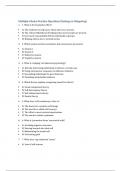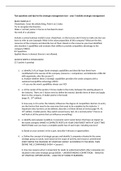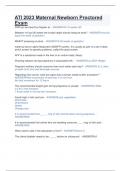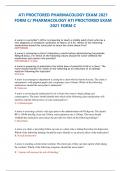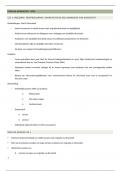Exam Questions & Detailed Answers
**1. You want to assess for jugular vein distention (JVD). What position
would be BEST?**
A) Position patient flat on their back
B) Position patient on their back with head of bed at 30 to 45 degrees
C) Position patient upright at a 90-degree angle
D) Position patient on their side
Answer: B) Position patient on their back with head of bed at 30 to 45
degrees.
Explanation: This position allows better visualization of the neck veins for
assessing JVD.
**2. Your patient with triple cardiac bypass surgery is post-op day 3. They
suddenly report palpitations. Their blood pressure is 130/76 and heart rate is
1/6
,140 bpm. What would you do NEXT?**
A) Administer a beta-blocker
B) Check the patient's lab values
C) Perform a bedside EKG
D) Call the physician
Answer: C) Perform a bedside EKG.
Explanation: An EKG is necessary to evaluate the patient’s rhythm and
identify any arrhythmias.
---
**3. Your patient has a history of renal insufficiency. What class of
analgesics would MOST likely be contraindicated for them?**
A) Opioids
B) Nonsteroidal anti-inflammatory medications
C) Acetaminophen
D) Muscle relaxants
Answer: B) Nonsteroidal anti-inflammatory medications.
Explanation: NSAIDs can adversely affect renal function, making them
contraindicated in patients with renal insufficiency.
---
2/6
,**4. Your patient is acutely ill. What route of medication administration would
likely be LEAST effective?**
A) Intravenous
B) Oral
C) Subcutaneous
D) Intramuscular
Answer: D) Intramuscular.
Explanation: In acutely ill patients, the intramuscular route may be less
effective than intravenous administration due to reduced muscle perfusion.
---
**5. You are working with the code team to resuscitate a patient in ventricula
fibrillation. Chest compressions are ongoing, and the patient has been
shocked twice. What emergency medication, if any, would you administer at
this juncture?**
A) Adenosine
B) Amiodarone
C) Epinephrine (Adrenaline) 1 mg IV
D) Atropine
Answer: C) Epinephrine (Adrenaline) 1 mg IV.
Explanation: Epinephrine is indicated during cardiac arrest to increase
perfusion pressure.
3/6
, ---
**6. Your patient is on anticoagulant medication. You are discharging them
and providing patient education. Which statement by your patient indicates
an understanding of the education?**
A) I will take ibuprofen (Motrin®) for my headache.
B) I will not take ibuprofen (Motrin®) every day.
C) I can continue taking my aspirin every day.
D) I can eat what I want without change.
Answer: B) I will not take ibuprofen (Motrin®) every day.
Explanation: This indicates an understanding that NSAIDs should generally
be avoided due to their potential to increase bleeding risk when on
anticoagulants.
---
**7. Your non-verbal patient is alert. What type of pain assessment would be
appropriate?**
A) Visual pain scale
B) Verbal descriptive scale
C) Vital signs assessment to approximate pain
D) Behavioral pain scale
4/6

